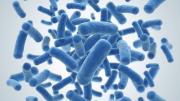While pricey, so-called detox juice drinks are becoming increasingly popular, friendly microbes are continuously detoxifying our bodies for free. More than a trillion bacteria live in the human gut and chemically alter the molecules people ingest. Nitzan Koppel, Ph.D. ’18, and Vayu Rekdal, A.M ’17, reveal some of the beneficial and dangerous chemical reactions caused by those microbes in a Science review published today—“Chemical transformation of xenobiotics by the human gut microbiota.” Their research shines light on a poorly understood topic, but also cautions that more research is needed to understand the chemical reactions and prevent them from harming humans.
The gut microbiome differs significantly from any other environment in the human body because of the diverse set of bacteria living there. “Gut microbes can do chemistry in ways that human cells can’t,” and therefore “expand the types of molecules that the human body is exposed to,” explains Emily Balskus, Kahn associate professor of chemistry and chemical biology and senior author of the review, who supervised Koppel’s work. And those “trillions of organisms” are “performing some amazing chemistry that is likely having a big impact on our biology.”
That “big impact” can be helpful, but can also be dangerous because the gut microbiota radically changes food and medicine. For example, some of the bacteria’s chemical processes can make an ordinary medicine lethal. Conversely, those processes can also activate a drug to produce beneficial outcomes. The consequences vary depending on the person and medicine.
Much of the difficulty in understanding the gut microbiome lies in the variation from person to person. There is also significant variation in the environment and resident bacteria between various parts of the gastrointestinal tract. Adding further complexity, not all members of one bacterial species behave alike. For example, Balskus notes that digoxin, a drug used to treat heart failure, is made inactive by the microbiomes of 5 percent of patients. Researchers led by Peter Turnbaugh, a former Bauer fellow at Harvard's center for systems biology and current assistant professor at the University of California San Francisco, found the bacterial species responsible—but only some of the individual organisms in that species were actually doing the damage. In some cases, people whose biomes contain the bacteria still found the drug effective; in others, the bacteria rendered the drug ineffective.
In order to truly understand the gut microbiota, and to solve mysteries like the digoxin case, researchers must start investigating the genes and enzymes responsible for bacteria’s chemical processes. After the scientists discovered the gene inactivating digoxin, for example, they successfully inhibited it with a protein found in meat and grains.
Balskus’s lab is also identifying the specific genes that produce harmful chemical reactions. Her group currently studies choline, a nutrient in eggs and meat. The microbiota can transform it into a chemical which directly causes diseases like “heart disease, liver disease, [and] kidney disease” in animals, she says. The scientists “searched genomes of organisms that could use choline,” and used that to identify the enzyme responsible for the transformation, which was “not just confined to one species.” Her lab now plans to find inhibitors that can prevent the bacteria from transforming choline into the harmful compound.
This treatment represents some of the important applications for connecting genes and microbiota. By understanding the exact mechanisms bacteria use to affect food and medicine, Balskus says, researchers can create medical interventions to prevent the bacteria from harming our bodies. They can also harness the chemistry for good, opening doors to personalized medicine and nutrition. This research, she says, is “critical for tapping into this enormous potential of the microbiome to benefit human health.”








